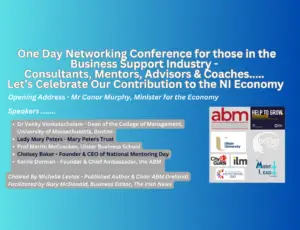Women-owned businesses are a growing force in the economy, however, women investors aiming to support female entrepreneurs definitely face specific barriers. Here are some that I can think of….
1) Limited Access to Investment Networks: in NI for example, these are limited and make it difficult for women to access informal deal flows and discover investment-ready female-led businesses to invest in
2) Cultural and Societal Barriers: persistent stereotypes about women being risk-averse or financially inexperienced discourage women from investing or seeking investments. In my work at MENTupLEADup® we define 8 types of business leaders which I believe is far more relevant to attitudes to risk than the gender of the person at the helm.
3) Limited Deal Flow from Women-Owned Businesses: the relatively small pool of female entrepreneurs in Northern Ireland limits the range of investable opportunities, especially in high-growth sectors like technology. Encouraging women to enter these fields can expand opportunities for investors. We are making inroads in our schools encouraging girls into STEM but we have a long way to go!
4) Regional Economic Constraints: Northern Ireland’s economic challenges, compounded by Brexit, affect both business viability and investment returns. Cross-Border collaborations and the wider UK can provide additional resources and opportunities.
5) CMAC® Support: a lack of visible female business support experts in the investment space hinders aspiring women investors.
Bias and Discrimination
6) Fragmented Support Ecosystems: the lack of coordination among support organisations makes it challenging for women to navigate resources and opportunities.
All in all – investing in female-owned businesses in Northern Ireland presents an opportunity to drive economic growth and gender parity. By addressing barriers such as limited networks, cultural stereotypes, and capital access, we can create a supportive ecosystem for women investors and entrepreneurs alike. Building strong networks, providing excellent authentic support and fostering inclusive opportunities are key steps toward a more equitable and prosperous future.






